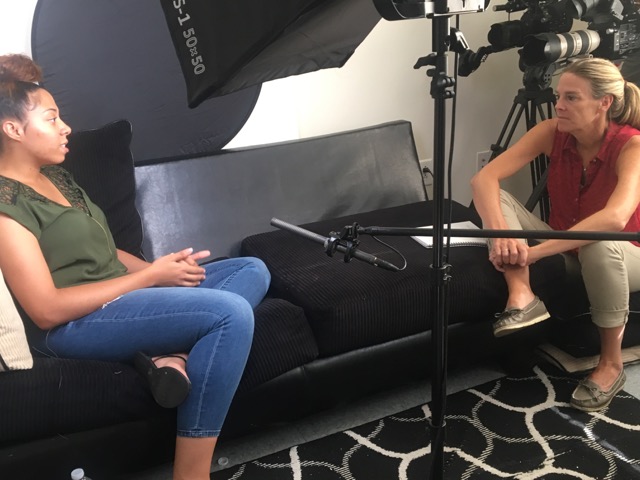“Behind the Bullet” is a documentary, directed and produced by Heidi Yewman, with the tagline: “4 Shooters. 4 Stories. A New Perspective on Gun Violence.”
Yewman is a graduate of Columbine High School and lost her former basketball coach Dave Sanders in the 1999 mass shooting. She’s since written a book, also called “Beyond the Bullet,” subtitled “Personal Stories of Gun Violence Aftermath.”
Still, she intentionally tried to keep her own bias out of it. “I want to have a conversation with people, especially gun owners, and I can’t do that if they’re feeling judged or preached to.”
Thus, the film offers no statistics till the closing credits. And its focus is not on people who have been shot, but rather the impact on those who have pulled the trigger.
The first person we meet is Christen McGinnes, who is putting on makeup and has clearly undergone some kind of major physical trauma. “One of the hardest things I had to face was not having a face,” she says. “The two years I couldn’t eat, talk or drink were the most difficult.”

McGinnes had bought a gun in case someone broke into her room. In a moment of profound emotional pain, she picked it up, went out on her balcony, prayed for forgiveness, and shot herself in the head.
She now works with other gunshot trauma victims, and at the time had undergone 45 surgeries. I had to close my eyes during Operation No. 46 shown in the film, but the point was well taken: This is what a gunshot does to a human face.
Says Yewman: “It was hard to find someone who had survived a suicide by gun, and who could and would talk about it. We spend a lot of time talking about school shootings, but the fact is that 60 percent of gun deaths are from suicide. So I felt I really should include one such story.”

Will Little, an African-American from the streets of Philadelphia, was 18 when he shot and killed another 18-year-old. He served 10 years. When he went to prison, his girlfriend was pregnant with their son who is now a teenager. Little worked hard while there to develop into a worthy man and father.
In an especially moving scene in the film, a gathering of local black men sit in a playground talking. “We all grew up believing a lie that the streets told us. That you couldn’t back down from an argument. That you can’t apologize to another man.”
Of this small group, three have lost sons. The tearing of the fabric of the community is palpable.
But so is the desire to do better for the next generation. Little now proudly mentors his son and heads up a neighborhood organization called Redemption, Forgiveness, Peace (RFP).
Kevin Leonard, “a born and raised country boy,” came home from turkey hunting one day several years ago, saw a strange SUV out front, and found two intruders in his home.
One man got away but after firing a single shot, the other “fell right there in the grass. He would not quit moving.” Though otherwise thoughtful and sensitive, Kevin stood there for the 30 to 40 minutes it took for the cops to arrive, watching him die.

Today his property is barricaded. He has motion detectors, trip wires, and firearms galore.
“I wake up lost. My dreams are horrible. … I see things at night. … People make comments, like ‘Hey Kevin how ya doin, ya kill anybody today?’ ”
Beth, the mother of sons Taylor and Matthew, is still weeping 10 years after the incident that derailed her life.
“Daron [her husband and the boys’ father] was traveling a lot. So I asked for a little gun, just a little protection for me and the boys. I had it out a lot at night and I guess that particular morning I just forgot to put it up.”
Taylor, then 8, picked up the gun one morning and shot his 5-year-old brother Matthew in the forehead.
Daron, a music minister, and his parents, also in ministry, choose their words carefully. With their faith as the backdrop, they developed a kind of script: This is how we’re going to think about it, this is how we’re going to talk about it. “We spoke of it in terms of an accident.”

Nonetheless, Daron and Beth are now divorced. A teenager now, Taylor makes bombs with his high school buddies and stages explosions for fun. And faith notwithstanding Daron, choking up, says, “In a lot of ways, it feels like the morning has never come.”
The film has already won several awards and Yewman hopes to release it commercially in the fall.
She says, “I feel there’s a false narrative to the effect that you can be the good guy with a gun and save the day killing a ‘bad guy’ with your gun. In the film, Kevin shows very clearly that you don’t just kill someone who’s threatened you or your family, and move on with your day and your life. A moral injury occurs.”
I, too, came away haunted by his suffering. Supreme irony: The guys who broke into his home that fateful day were trying to steal — you guessed it — his guns.
Heather King is a blogger, speaker and the author of several books. For more, visit heather-king.com.
SPECIAL OFFER! 44 issues of Angelus for just $9.95! Get the finest in Catholic journalism with first-rate analysis of the events and trends shaping the Church and the world, plus practical advice from the world’s best spiritual writers on prayer and Catholic living, along with great features about Catholic life in Los Angeles. Subscribe now!

